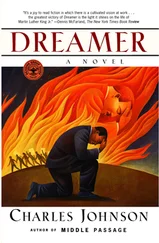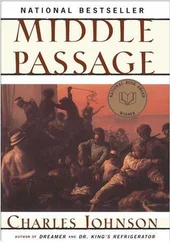He smiled sideways at her. “Who?”
“The people in your kwoon.” Evelyn crossed her arms. “I read somewhere that most body builders are homosexual.”
He refused to answer her.
“If they’re not gay, then maybe I should take lessons. It’s been good for you, right?” Her voice grew sharp. “I mean, isn’t that what you’re saying? That you and your friends are better’n everybody else?”
Rudolph’s head dropped; he drew a long breath. Lately, his responses to her took the form of quietly clearing his lungs.
“You should do what you have to, Evelyn. You don’t have to do what anybody else does.” He stood up, touched his toes, then brought his forehead straight down against his unbent knees, which was physically impossible, Evelyn would have said — and faintly obscene.
It was a nightmare to watch him each evening after dinner. He walked around the house in his Everlast leg weights, tried push-ups on his fingertips and wrists, and, as she sat trying to watch “The Jeffersons,” stood in a ready stance before the flickering screen, throwing punches each time the scene, or shot, changed to improve his timing. It took the fun out of watching TV, him doing that — she preferred him falling asleep in his chair beside her, as he used to. But what truly frightened Evelyn was his “doing nothing.” Sitting in meditation, planted cross-legged in a full lotus on their front porch, with Mr. Miller blissfully curled on his lap, a Bodhisattva in the middle of houseplants she set out for the sun. Looking at him, you’d have thought he was dead. The whole thing smelled like self-hypnosis. He breathed too slowly, in Evelyn’s view — only three breaths per minute, he claimed. He wore his gi, splotchy with dried blood and sweat, his calloused hands on his knees, the forefingers on each tipped against his thumbs, his eyes screwed shut.
During his eighth month at the kwoon, she stood watching him as he sat, wondering over the vivid changes in his body, the grim firmness where before there was jolly fat, the disquieting steadiness of his posture, where before Rudolph could not sit still in church for five minutes without fidgeting. Now he sat in zazen for forty-five minutes a day, fifteen when he awoke, fifteen (he said) at work in the mailroom during his lunch break, fifteen before going to bed. He called this withdrawal (how she hated his fancy language) similar to the necessary silences in music, “a stillness that prepared him for busyness and sound.” He’d never breathed before, he told her. Not once. Not clear to the floor of himself. Never breathed and emptied himself as he did now, picturing himself sitting on the bottom of Lake Washington: himself, Rudolph Lee Jackson, at the center of the universe; for if the universe was infinite, any point where he stood would be at its center — it would shift and move with him. (That saying, Evelyn knew, was minted in Douglas Chan’s mind. No Negro preacher worth the name would speak that way.) He told her that in zazen, at the bottom of the lake, he worked to discipline his mind and maintain one point of concentration; each thought, each feeling that overcame him he saw as a fragile bubble, which he could inspect passionlessly from all sides; then he let it float gently to the surface, and soon — as he slipped deeper into the vortices of himself, into the Void — even the image of himself on the lake floor vanished.
Evelyn stifled a scream.
Was she one of Rudolph’s bubbles, something to detach himself from? On the porch, Evelyn watched him narrowly, sitting in a rain-whitened chair, her chin on her left fist. She snapped the fingers on her right hand under his nose. Nothing. She knocked her knuckles lightly on his forehead. Nothing. (Faker, she thought.) For another five minutes he sat and breathed, sat and breathed, then opened his eyes slowly as if he’d slept as long as Rip Van Winkle. “It’s dark,” he said, stunned. When he began, it was twilight. Evelyn realized something new: He was not living time as she was, not even that anymore. Things, she saw, were slower for him; to him she must seem like a woman stuck in fast-forward. She asked:
“What do you see when you go in there?”
Rudolph rubbed his eyes. “Nothing.”
“Then why do you do it? The world’s out here!”
He seemed unable to say, as if the question were senseless. His eyes angled up, like a child’s, toward her face. “Nothing is peaceful sometimes. The emptiness is full. I’m not afraid of it now.”
“You empty yourself?” she asked. “Of me, too?”
“Yes.”
Evelyn’s hand shot up to cover her face. She let fly with a whimper. Rudolph rose instantly — he sent Mr. Miller flying — then fell back hard on his buttocks; the lotus cut off blood to his lower body — which provided more to his brain, he claimed — and it always took him a few seconds before he could stand again. He reached up, pulled her hand down, and stroked it.
“What’ve I done?”
“That’s it,” sobbed Evelyn. “I don’t know what you’re doing.” She lifted the end of her bathrobe, blew her nose, then looked at him through streaming, unseeing eyes. “And you don’t either. I wish you’d never seen that movie. I’m sick of all your weights and workouts — sick of them, do you hear? Rudolph, I want you back the way you were: sick” No sooner than she said this Evelyn was sorry. But she’d done no harm. Rudolph, she saw, didn’t want anything; everything, Evelyn included, delighted him, but as far as Rudolph was concerned, it was all shadows in a phantom history. He was humbler now, more patient, but he’d lost touch with everything she knew was normal in people: weakness, fear, guilt, self-doubt, the very things that gave the world thickness and made people do things. She did want him to desire her. No, she didn’t. Not if it meant oral sex. Evelyn didn’t know, really, what she wanted anymore. She felt, suddenly, as if she might dissolve before his eyes. “Rudolph, if you’re ‘empty,’ like you say, you don’t know who — or what — is talking to you. If you said you were praying, I’d understand. It would be God talking to you. But this way…” She pounded her fist four, five times on her thigh. “It could be evil spirits, you know! There are evil spirits, Rudolph. It could be the Devil.”
Rudolph thought for a second. His chest lowered after another long breath. “Evelyn, this is going to sound funny, but I don’t believe in the Devil.”
Evelyn swallowed. It had come to that.
“Or God — unless we are gods.”
She could tell he was at pains to pick his words carefully, afraid he might offend. Since joining the kwoon and studying ways to kill, he seemed particularly careful to avoid her own most effective weapon: the wry, cutting remark, the put-down, the direct, ego-deflating slash. Oh, he was becoming a real saint. At times, it made her want to hit him.
“Whatever is just is,” he said. “That’s all I know. Instead of worrying about whether it’s good or bad, God or the Devil, I just want to be quiet, work on myself, and interfere with things as little as possible. Evelyn,” he asked suddenly, “how can there be two things?” His brow wrinkled; he chewed his lip. “You think what I’m saying is evil, don’t you?”
“I think it’s strange! Rudolph, you didn’t grow up in China,” she said. “They can’t breathe in China! I saw that today on the news. They burn soft coal, which gets into the air and turns into acid rain. They wear face masks over there, like the ones we bought when Mount St. Helens blew up. They all ride bicycles, for Christ’s sake! They want what we have.” Evelyn heard Rod Kenner step onto his screened porch, perhaps to listen from his rocker. She dropped her voice a little. “You grew up in Hodges, South Carolina, same as me, in a right and proper colored church. If you’d been to China, maybe I’d understand.”
Читать дальше












